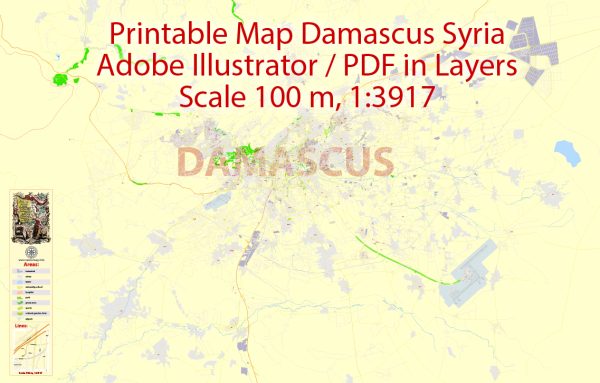Damascus, the capital of Syria, is one of the oldest continuously inhabited cities in the world. Its history is rich and diverse, spanning thousands of years. Here’s a brief description of its history:
- Ancient History: Damascus has a history that dates back over 4,000 years. It was originally founded as a settlement in the third millennium BCE. The city’s strategic location on the Barada River made it an important center for trade and culture. In the first millennium BCE, it was conquered by the Arameans, followed by the Assyrians and the Persians.
- Roman and Byzantine Period: Damascus became part of the Roman Empire in the first century BCE and later became a major city within the Byzantine Empire. During this time, it played a significant role in the spread of Christianity.
- Islamic Era: In the 7th century CE, Damascus was conquered by the Islamic Caliphate, and it became a prominent city within the Islamic world. The Umayyad Caliphate established its capital in Damascus in 661 CE. This era marked a period of architectural and cultural achievements, including the construction of the Umayyad Mosque, one of the most important Islamic architectural monuments.
- Crusader and Mamluk Period: Damascus was captured by Crusaders in 1099 but was soon retaken by Muslim forces. It later came under the control of the Mamluks in the 13th century.
- Ottoman Rule: In the 16th century, Damascus became part of the Ottoman Empire and remained under Ottoman rule for several centuries. During this time, the city continued to thrive as a center of trade and culture.
- French Mandate: After World War I, Syria came under French control as a League of Nations mandate. Damascus played a significant role in the struggle for Syrian independence, and it became the capital of the newly established State of Syria in 1920.
- Modern History: After gaining independence in 1946, Damascus has been the capital of the Syrian Arab Republic. In recent decades, the city has been marked by periods of political instability and conflict, particularly during the Syrian Civil War, which began in 2011 and has had a profound impact on the city and its people.
Today, Damascus stands as a city with a rich cultural heritage, known for its historical sites, such as the Umayyad Mosque, the Old City, and its vibrant souks (markets). Despite the challenges it has faced in recent years, it remains an important cultural and historical center in the Middle East, with a long and storied history that has left an indelible mark on the region.


 Author: Kirill Shrayber, Ph.D. FRGS
Author: Kirill Shrayber, Ph.D. FRGS